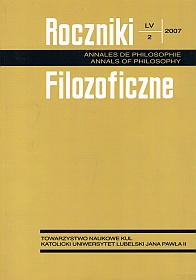Dowód matematyczny z punktu widzenia formalizmu matematycznego. Część II
Abstrakt
In the second part I discuss Frege’s and Hilbert views on the nature of mathematical proof, in particular their discussion concerning the problem of implicit definitions. I also discuss Hilbert’s program and conclude with some remarks concerning the problem of the “decline of intuition” in the formalistic conception of mathematical proof.
Bibliografia
Bernays P. (1967): Hilbert, David, [w:] P. Edwards (red.), The Encyclopedia of Philosophy, vol. 3, New York: Macmillian Publishing Co. and The Free Press, 496-504.
Detlefsen M. (2005): Formalism, [w:] S. Shapiro (red.), The Oxford Handbook of Philosophy of Mathematics and Logic, Oxford: Oxford University Press, 236-317.
Feferman S. (2000): Mathematical intuition vs. mathematical monsters, „Synthese” 125, 317-332.
Frege G. (1903): Grundgesetze der Arithmetik 2, Jena: H. Pohle.
Frege G. (1906): Über die Grundlagen der Geometrie, „Jahresbericht der Deutschen Mathematiker-Vereinigung” 12, 319-324, 368-375.
Freudenthal H. (1962): The main trends in the foundations of geometry in the 19th century, [w:] E. Nagel, P. Suppes, A. Tarski (red.) Logic, Methodology and Philosophy of Science, Proceedings of the 1960 Congress, Stanford: Stanford University Press, 613-621.
Hahn H. (1980): Empiricism, Logic and Mathematics, Dordrecht–London–Boston: D. Reidel.
Heine E. (1872): Die Elemente der Funktionenlehre, „Journal für die reine und angewandte Mathematik” 74, 172-188.
Hilbert D. (1926): Über das Unendliche, „Mathematische Annalen” 95, 161-190. Przekład polski w: Murawski 1986, 288-307.
Hilbert D. (1928): Die Grundlagen der Mathematik, „Abhandlungen aus dem mathematischen Seminar der Hamburgischen Universität” 6; 65-85. Przekład angielski w: J. Van Heijenoort: From Frege to Gödel: A Sourcebook in Mathematical Logic, 1879-1931, Cambridge, Mass.: Harvard University Press 1967, 464-479.
Kant I. (1957): Krytyka czystego rozumu, t. I, tł. R. Ingarden, Warszawa: PWN.
McCarty D. C. (2004): David Hilbert and Paul du Bois-Reymond: Limits and Ideals, [w:] G. Link (red.), One Hundred Years of Russell’s Paradox, Berlin–New York: Walter de Gruyter, 517-532.
Murawski R. (1984): G. Cantora filozofia teorii mnogości, „Studia Filozoficzne” 11-12 (8-9), 75-88.
Murawski R. (1986) (red.): Filozofia matematyki. Antologia tekstów klasycznych, Poznań: Wydawnictwo UAM.
Murawski R. (1993): Rozwój programu Hilberta, „Wiadomości Matematyczne” 30, 51-72.
Poincaré H. (1952): Science and Method, New York: Dover Publications.
Shapiro S. (1996): Space, Number and Structure: A Tale of Two Debates, „Philosophia Mathematica” 3 (4), 148-173.
Shapiro S. (2000): Thinking about Mathematics. The Philosophy of Mathematics, Oxford: Oxford University Press,.
Shapiro S. (2005): Categories, Structures, and the Frege-Hilbert Controversy: The Status of Meta-mathematics, „Philosophia Mathematica” 13 (1), 61-77
Sieg W. (1984): Foundations for analysis and proof theory, „Synthese” 60, 159-200.
Simpson S.G. (1988): Partial Realisations of Hilbert’s Program, „Journal of Symbolic Logic” 53, 349-363.
Smorynski C. (1977): The incompleteness theorem, [w:] J. Barwise (red.), Handbook of mathematical logic, Amsterdam: North-Holland, 821-864.
Thomae J. (1898): Elementare Theorie der analytischen Funktionen einer complexen Veränderlichen, 2. Aufl., Halle: L. Nebert.
Zermelo E. (1908): A new proof ot the possibility of a well-ordering, [w:] J. van Heijenoort (red.), From Frege to Gödel. A source-book in mathematical logic, 1879-1931, Cambridge, Mass.: Harvard University Press 1967, 183-198.
Copyright (c) 2007 Roczniki Filozoficzne

Utwór dostępny jest na licencji Creative Commons Uznanie autorstwa – Użycie niekomercyjne – Bez utworów zależnych 4.0 Międzynarodowe.





